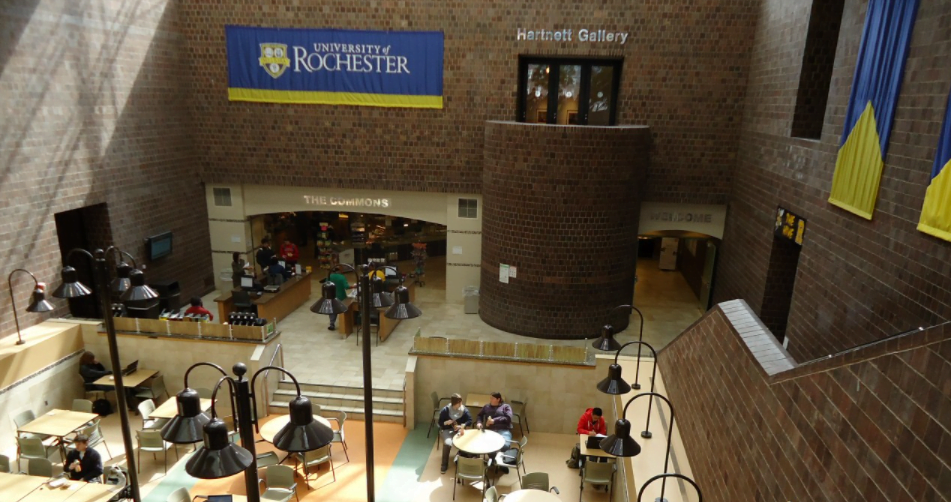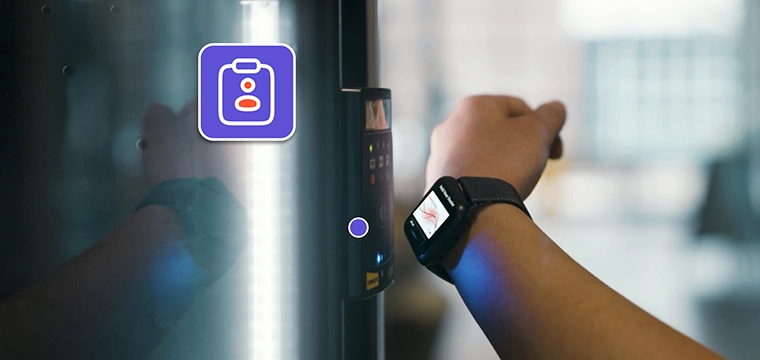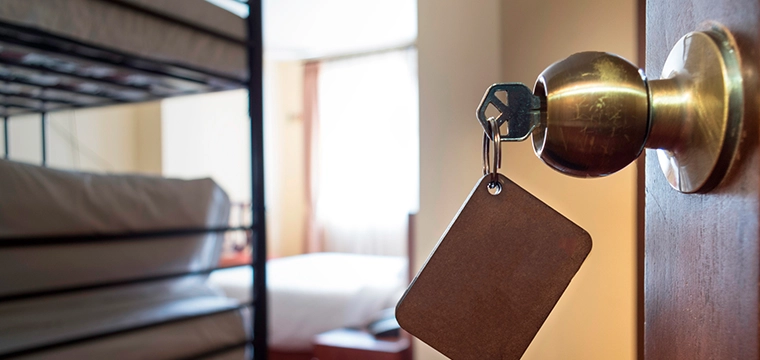
Student facing services benefit from strong campus-vendor partnership
Engaged staff at Rochester are pushing some of the limits of the Grubhub platform, using the system in unique ways beyond just mobile ordering. This healthy partnership between campus and vendor has led to a cooperative pushing of boundaries and valuable problem solving both before and after a global pandemic.
The core idea for Rochester was to continually add to Grubhub mobile ordering as new challenges arose, rather than simply flip the switch. As it turns out, asking questions and posing new challenges is mutually beneficial.
“The truth is, we’ll never know how to do things as well as our on-site operators that work with students every day,” says Ben Anderson, Head of Industry Relations at Grubhub Campus. “It’s about partnership, making sure our clients know how the platform works, and empowering them to have an ongoing dialogue that allows us to evolve the platform to suit their needs.”
“Our platform is a tool more than it’s a technology, and the mindset from Rochester and from our side has been about solving real-world problems,” says Anderson. “Many of our recent initiatives have given partners more real-time control over the system and has allowed them to manage program changes as they happen.”
Rochester was one of the first 10 campus contracts going back to the early days of Tapingo mobile ordering, and the on-campus Starbucks location was one of the original proving grounds for the capabilities of campus mobile ordering.
“The Grubhub platform is a tool more than it’s a technology, and the mindset from Rochester and from our side has been about solving real-world problems."
“Many of the operator features and controls we have now are a result of this really busy Starbucks at Rochester,” says Anderson. “The foundation for our back-of-house technology came as a response to this specific Starbucks and other ultra-busy venues in the early days of campus mobile ordering. Challenges like needing to throttle incoming orders and make product changes on the fly to process in excess of 1,000 orders a day.”
“We were upsetting customers who were sitting in line, and losing walk-up customers who would see the line and avoid it altogether,” says Cam Schauf, Director of Campus Dining Services and Auxiliary Operations, University of Rochester.
“Mobile ordering not only reduced the traffic to nearly no lines, it also led to an increase in overall business,” explains Schauf. “Our staff and faculty were not as quick to adopt mobile ordering, but our students use it so much that others don’t have to fight long lines and are coming in more often.”
These early experiences remain core to the Grubhub campus platform to this day.
"We learned early on that having operational controls are one thing, but providing those controls in real time is where the dramatic results come from."
“What we learned early on is that having operational controls are one thing, but providing those controls in real time is where the dramatic results come from,” says Anderson.
Rochester, like so many universities in the wake of COVID, had to determine whether or not to refund student meal plans, and for those that remained on campus, provide dining services in a new environment.
In March 2020 when the COVID panic was at its worst, Rochester began a dialogue with Grubhub about off campus use of its on-campus spending accounts.
“Within 48 hours they were able make this shift so that any student – at home or on campus – could use dining dollars to place mobile orders, and get the student discount offered through Grubhub+,” explains Schauf.
Prior to COVID, students couldn’t use swipes from their meal plans through Grubhub, they could only use money or declining balance. When the pandemic arrived, students were kept away from dine-in locations and needed an alternative.
"With COVID we wanted to get more students through lines quicker and offer flexibility, so we worked with Grubhub to add meal swipes and rolled mobile ordering out to our residential dining facilities."
“We were trying to figure out from a business standpoint why we would enable meal swipe use on Grubhub, but with COVID and wanting to get more students through lines quicker and offer flexibility, we added meal swipes and rolled mobile ordering out to our residential dining facilities,” explains Schauf.
While those numbers weren’t substantial, Schauf explains that it was significant for those students who were left trying to decide where to eat at a time when they didn’t want to go inside their favorite dining halls through personal fear or anxiety. “The availability of Grubhub has let students get food from us without ever having to come inside the building,” he says.
In addition to its mandatory undergrad meal plan, Rochester also has an optional spending account that Schauf wanted to maximize in the students’ time of need.
“Our students with meal plans started staying in and didn’t want to go out to eat,” says Schauf. “I told Grubhub that I needed to get our optional spending account set up for mobile ordering as well as our meal plan declining balance funds to give students more dining options.”
“I posed the question, and initially asked if could just offer it for the rest of the semester,” adds Schauf. “Grubhub went to work for us and we were up and running within the week.”
As it turned out, the decision to include students’ optional spending accounts on Grubhub was a good one.
“Students spent a couple hundred thousand dollars as a result of the initiative,” says Schauf. “It was a scenario where we had no choice; it solved a problem that we needed to solve in that moment.”
Beyond the pandemic, Rochester has also been able to deliver on some unique requests through mobile ordering, made possible only through the university’s longstanding and collaborative relationship with Grubhub.
Core to many of these initiatives is Tara Arliss of Harvest Table Culinary, The University of Rochester’s food-service provider. Arliss is the resident Grubhub platform expert for Rochester, acting as a liaison of sorts between the university and Grubhub.
“There have been a lot of instances when we’ve brainstormed together to find ways to use Grubhub’s platform in new ways,” says Arliss.
“One of the things that helped us is that Tara worked closely with people at Grubhub and brought them to campus to better understand our environment here at Rochester,” explains Schauf. “She’s put in the time to understand Grubhub’s product so that we can do some new things they’ve never done before.”
“There have been a lot of instances when we’ve brainstormed together to find ways to use Grubhub’s platform in new ways."
One such initiative is Rochester’s Team Green program that’s devoted to environmental issues at Rochester.
“We’re leveraging Grubhub for their reusable mug program at Starbucks that offers discounted coffee if you bring your own mug,” says Arliss. “We posed the idea to Grubhub to let people use the platform to order a reusable mug and to do more business.”
“For reusable mug coffee purchases, the ticket comes through the same ticket printer – or a separate printer if you choose – and then prompts the user to go to the side and see a barista who is stationed as the hand-off mobile order barista,” explains Arliss.
Students then asked if Rochester Dining could offer silverware that students could wash and reuse.
“We came up with a program that you can purchase a silverware set through the Grubhub app,” says Arliss. “Not only can you buy the silverware from us through Grubhub, but when you place an order you can also decline on the menu any disposable utensils, straws or napkins.”
The silverware set includes a stainless steel knife, fork, spoon and chopsticks. “We’re selling them at cost – less than $3.00 per set – because we didn’t want to make money off of them,” explains Schauf.
Those were options that Rochester was able to build into its mobile ordering experience, made possible only through posing the question to Grubhub. “Students really appreciate knowing that we’re doing everything we can to cut waste where possible,” says Schauf.
Rochester is also supporting grocery list orders through Grubhub. “We’re not doing delivery yet, but we support pick up grocery orders,” says Schauf.
“That was another good example of a workaround we found with Grubhub. I pitched opening a shop for a four-hour window with a prompt that displays a grocery pickup window,” says Arliss. “Grubhub has been great about tweaking its system to work for us.”
Another example of the joint problem solving between Grubhub and Rochester came when a ticket printer went down at the campus’ late-night dining location. “No one was on campus there to flip the printer over and we had no other options,” says Arliss. “So I posed the idea to Grubhub – and they made it happen – to just turn on email tickets for the night.”
“It’s nice that our challenges and solutions can help create opportunities for other campuses to learn from and use,” adds Arliss.
Mobile ordering may be old hat to Rochester now, having been one of the earliest adopters. But it’s the open dialogue and work between Rochester dining, its food-service provider, and Grubhub that are continuing to pay real dividends.
“We need to be able to react to the market as quickly as we can, and Rochester’s use of our platform proves the value of that,” says Anderson. “Our campuses know their business better than anyone, and we want them to have the power to manage their environments with our technology.”
“Engaged operators on campus, like at Rochester, have helped Grubhub to go through our latest evolution as a company these past few years."
And everything that is done collaboratively with Rochester also helps Grubhub to refine the platform for other client campuses.
“Engaged operators on campus, like at Rochester, have helped us to go through our latest evolution as a company these past few years,” he adds. “They’ve been key to helping us make sure we give our campus operators all the resources they need to thrive on the platform.”




